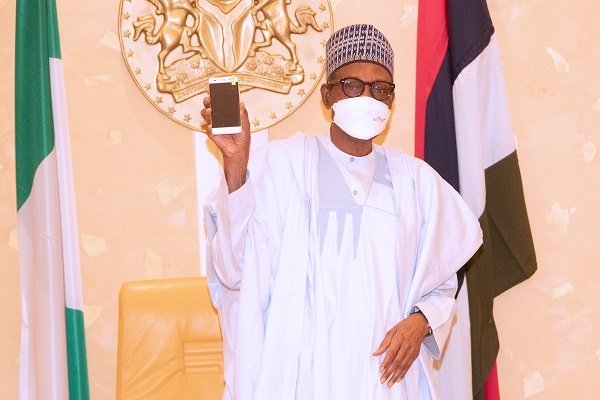Samsung, Apple, Infinix, Nokia and other big smartphone brands are still the prominent devices in the hands of many Nigerians. President Buhari on Wednesday, July 9, 2021 received the first made in Nigeria cell phone (ITF mobile). Where are the Nigeria-made-phones? Daily Trust reports.
- Call for Masari’s resignation absurd – Media aide
- 2023: Buhari, Tinubu pact not binding on APC members – Kogi governor
Since the advent of Global System for Mobile Communications (GSM) in the country on August 8, 2001, Nigeria has been serving as a huge market for all the global big brands and the rock bottom Chinese mobile phones. The country is biggest smartphone market in Africa, according to a report by the GSMA, a global association of all the GSM operators across the world.
20 years after GSM, the two smartphones produced and assembled in the country are still unknown in the market as they struggle for survival with phone manufacturing companies like South Korean-based Samsung, US-based Apple, Infinix of France and Nokia’s Finnish multi-national company, and so on.
Apart from AfriOne, a Nigeria smartphone manufacturing company which began assembling android operating system based phones in the country in 2017, Nigeria’s skill training agency, the Industrial Training Fund (ITF) started producing another 4G-enabled smartphone in 2020.
Located along the Oshodi Expressway in Lagos State, AfriOne assembles smartphones and other devices from imported components, but the company said it would soon start full production from scratch in Lagos.
It was launched with the Champion and Gravity range of smartphones but will produce more consumer devices and accessories, AfriOne co-founder and CTO Hemang Kapur, said. The assembly plant currently employs a staff strength of about 200 on the lines, administrative and non-administrative staff.

“This is just the beginning of a long journey. Today, yes, we are mainly assembling our phones using components that are imported but there are lots of research and development that goes on locally right now to produce the phone; the software that we are developing again has been customized for the local market. All our packaging is done locally. But now we are also looking at some of the components and accessories to be produced over here locally,” said Sahir Berry, founder and CEO Afrione.
It took AfriOne a year and half to set up its factory, which is a record time. The facility has an installed capacity of 300,000 ICT devices and accessories per months and now employs around 500, most of them young people, according to Berry.
“We also do applications. In the retail outlets that we are creating right now, we are actually creating what we call the entrepreneur programme, where we encourage people to come in, share their ideas with us, share technology applications that they want to create to help benefit the local society and we then help them develop those applications and actually push them out to the market. We are going to be working with almost 2000 students and youths to be able to push that out,” added Berry.
Unlike AfriOne, the ITF smartphone is produced from scratch by some young Nigerians at the ITF Model Skills Training Centre in Abuja. The smartphone is the first ever 4G phone made by locally sourced materials.
The Director-General of ITF, Joseph Ari, who launched the smartphone, dubbed “ITF Mobile” in Abuja said the ITF had trademarked and certified the phone with the Standards Organisation of Nigeria (SON).
The Ministers of Industry, Trade and Investment, Otunba Adeniyi Adebayo and Ambassador Mariam Katagum, had presented the made-in-Nigeria smartphone to President Muhammadu Buhari and Vice President Yemi Osinbajo and other members of the Federal Executive Council (FEC) on June 9, this year.
In an interview in his office, Ari said the home-grown technology was produced at ITF’s Model Skills Training Centre located in Abuja under the supervision of the Training Manager, Mrs Yinka Shodunke.
He said the materials for the phone were locally sourced in line with the Federal Government’s Executive Order 5 on use of local contents.
He said once the phone has been patented, a plant would be set up to mass produce it at a cheap price for Nigerians.
He said this would create jobs for skilled and unskilled Nigerians, and would thereby improve the country’s Gross Domestic Product.
However, the two locally made phone brands’ are yet to find their feet as the big brands continue to rule the Nigerian markets.
A phone vendor at the popular Computer Village at Otigba, Ikeja, Lagos, Ifeanyi Alozie, said phone buyers rarely ask for ITF or AfriOne phones. Alozie said this may not be unconnected with awareness and scarcity of the two products. According to him, the sellers do not always get the locally made brands to sell.
The Lagos-based phone vendor, who expressed happiness about the setting up of phone factories in the country, said the launching of the 4G phone is good news that many Nigerians are not aware of.
He said the production of phones locally would reduce unemployment and boost the country’s economy.
He said the federal government should implement more friendly policies which could encourage more investors to set up plants in the country.
“I commend the ITF for this great effort. I will advise the government not to delay in taking the efforts forward by mass producing the 4G. If this is done, it will reduce unemployment and boost the economy.” Alozie said.
Another phone vendor who is based in Abuja’s Banex Phone Market, Biodun Ogude, said the new smartphones by Nigerian technicians would provide consumers refreshing options, features and pocket-friendly alternative.
Ogude, however, expressed sadness that the phones aren’t in the market yet. “AfriOne is sold in some shops. But how many people actually patronise the brand? I think the company should put more efforts in its marketing and distribution strategy.”
He said with good marketing and strong distribution network, the brand will get to 35 per cent of Nigeria’s 200 million plus population that uses mobile phones. That means a huge revenue for the company, he added.
Before AfriOne and the ITF phones, there had been quite a number of smartphones manufactured by Nigerian makers. Though people who may have seen them may not know they are made in Nigeria, many of them have been in existence long before now. But sadly, many of them have ceased to exist due to low patronage by Nigerians.
Aspire 3 smartphone was manufactured by a Nigerian tech company, Solo, which was formed in 2012 by a group of telecoms professionals led by Tayo Ogundipe, a Nigerian-born ex-senior global executive with HTC and Sony. The phone could not find its feet and it was swept off due to Nigeria’s economic instability.
Another indigenous phone was Ankara K2 smartphone which was launched by a Nigerian device maker, Imose Mobile, around early 2015. The smartphone came in two colour variants of black and white and supports dual mini SIM.
TheAnkara K2 smartphone incorporates social networks including Whatsapp, BBM, Instagram, WeChat, Twitter and Facebook. It also incorporates English, French and Arabic language options. But sadly, the phone’s presence in the market has gone.
Plirisblazex-64 smartphone is also another phone produced by Nigerians. It was manufactured and released into the tech market in 2015 by Pliris Mobile Limited, a Nigerian tech company. It’s also no longer available in the market.
And both AfriOne and ITF Mobile should also hope the current wave of buy Made-In-Nigeria campaign help propel the sale of their smartphones across the country. Experts said this is the only way they could muscle their way into the big brands’ turf.

 Join Daily Trust WhatsApp Community For Quick Access To News and Happenings Around You.
Join Daily Trust WhatsApp Community For Quick Access To News and Happenings Around You.


